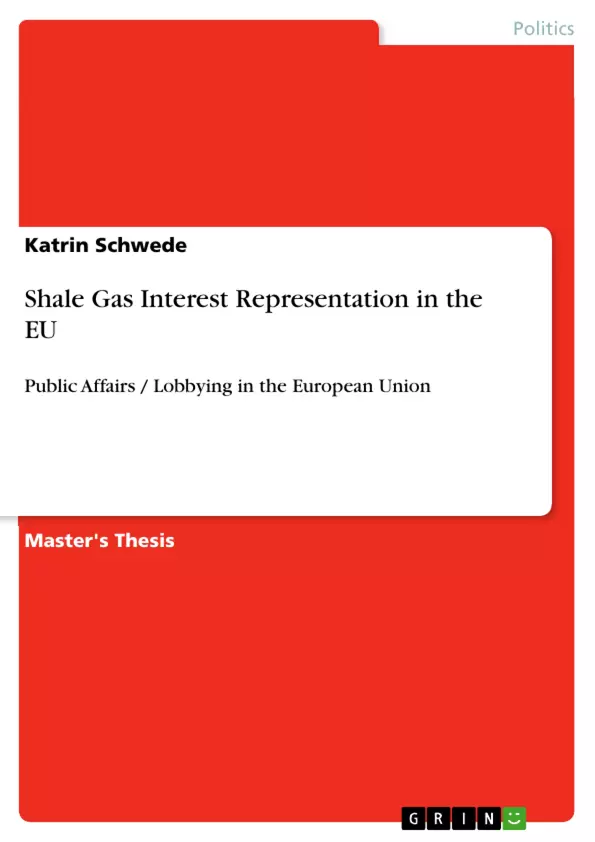The European oil & gas industry is concerned about the growing uproar
and opposition against shale gas. Despite shale gas’s importance and viability in North America, the potential for the development and recovery of shale gas in Europe is limited due to stricter regulation, legislation, and higher population density. There is going to be significant legal and regulatory developments relating to
unconventional gas all expected in the coming years, including a possible challenge being raised against hydraulic fracturing. This case study sets out to investigate the strategic considerations and lobbying activities undertaken by the shale gas industry, and to examine opportunities and challenges for the shale gas industry to
influence EU policy‐decisions. Previous attempts to lobby national and EU institutions have been rather sporadic, but there is great potential and willingness to streamline and channel expertise and information, which are critical resources for acquiring access to
the EU policy process. This paper looks at the theoretical framework of strategies of EU interest representation, more specifically at the way corporate and organisational factors influence the political
strategies of shale gas interest groups, and how firms’ lobbying strategies need to be adapted to the complexity of the EU policy
process. Resulting from this analysis, it is argued that the shale gas industry needs to form ad-‐hoc coalitions, which would allow to operate with the flexibility required in the dynamic, multi‐level
and technical EU energy sector.
Inhaltsverzeichnis (Table of Contents)
- Introduction
- Research Method and Data: Case Study
- Shale Gas: Resources, Arguments, and Regulations
- Opposition: Environmental and Health Concerns
- National Resources and Political Positions
- EU Legislative Framework
- Analytical Framework - Political strategies of EU interest representation
- Economic and organisational determinants of lobbying
- Institutional determinants of lobbying
- Analysis
- Conclusion
Zielsetzung und Themenschwerpunkte (Objectives and Key Themes)
This dissertation aims to investigate the strategic considerations and lobbying activities undertaken by the shale gas industry in the European Union (EU). The paper examines the opportunities and challenges for the industry to influence EU policy decisions, specifically in light of the growing opposition to shale gas development and the complexities of the EU policy process.
- Strategic considerations of the shale gas industry in the EU
- Lobbying activities of the shale gas industry in the EU
- Opportunities and challenges for influencing EU policy decisions
- Impact of opposition to shale gas development
- EU policy process and its implications for lobbying strategies
Zusammenfassung der Kapitel (Chapter Summaries)
- Introduction: This chapter sets the stage for the dissertation by introducing the growing importance of shale gas as an energy source and outlining the challenges it faces in Europe, including stricter regulations, environmental concerns, and opposition from pressure groups. It also highlights the strategic considerations and lobbying activities of the shale gas industry in the UK and lays out the research questions and methods for the study.
- Shale Gas: Resources, Arguments, and Regulations: This chapter provides an overview of shale gas resources globally, focusing on the EU. It explores the arguments for and against shale gas development, including environmental and health concerns related to hydraulic fracturing. The chapter also delves into the current EU legislative framework concerning unconventional gas resources.
- Analytical Framework - Political strategies of EU interest representation: This chapter explores the theoretical framework of EU interest representation, examining the economic, organizational, and institutional factors that influence lobbying strategies of shale gas interest groups. It analyzes how firms need to adapt their lobbying strategies to the complex nature of the EU policy process.
Schlüsselwörter (Keywords)
This dissertation focuses on the shale gas industry, its lobbying activities, and its influence on EU policy decisions. Key terms include: shale gas, hydraulic fracturing, environmental concerns, interest representation, EU policy process, lobbying strategies, strategic considerations, ad-hoc coalitions, and EU energy sector.
Frequently Asked Questions
What is the main challenge for the shale gas industry in the EU?
The industry faces stricter regulations, high population density, and significant public opposition compared to North America.
How does the shale gas industry attempt to influence EU policy?
The industry uses strategic lobbying and seeks to form ad-hoc coalitions to navigate the dynamic and multi-level EU energy sector.
What are the environmental concerns regarding shale gas?
Major concerns include the impacts of hydraulic fracturing (fracking) on water quality and health, which fuel strong opposition from pressure groups.
Why are ad-hoc coalitions recommended for this industry?
Ad-hoc coalitions provide the flexibility required to respond to the complex and technical nature of EU legislative processes.
What role does the EU legislative framework play?
The framework determines the legal feasibility of unconventional gas recovery, presenting both hurdles and opportunities for interest representation.
- Quote paper
- Katrin Schwede (Author), 2012, Shale Gas Interest Representation in the EU, Munich, GRIN Verlag, https://www.grin.com/document/188067



